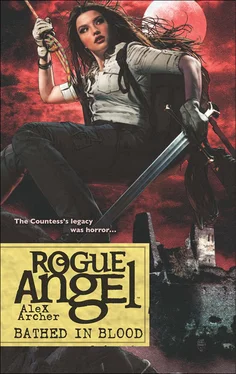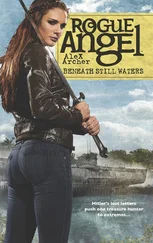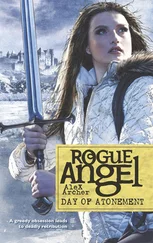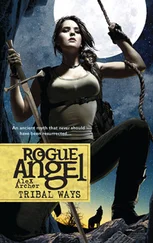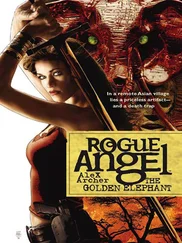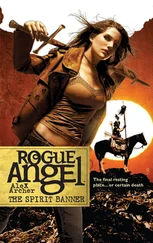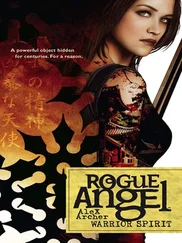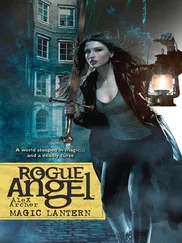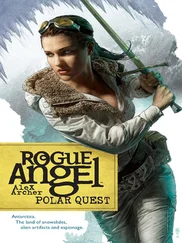“Satisfied?” she asked.
Tamás shrugged. “Just doing my job.”
“I would think you’d be interviewing the victim, not harassing the Good Samaritan who saved her life.”
The detective eyed her a moment and then sighed. “Trust me, if I could interview the injured woman, I would. Unfortunately, she passed away fifteen minutes ago, leaving you and Miss Polgár the last two people on earth to see her alive.”
Annja didn’t know what to say. She’d thought the woman was out of the woods when they’d gotten her to the hospital and turned her over to the medical staff.
Such a tragedy.
She wondered how Tamás had gotten word of the woman’s death, as he’d been in here with her for the past half hour and hadn’t taken any calls, but then she remembered his conversation with the guard outside the door when he’d retrieved her cell phone.
No wonder he’d wanted to verify her story. Annja and the woman who’d flagged her down were his only leads in what had suddenly become a murder investigation.
Annja looked up to find Tamás watching her, though this time with less hostility. She decided to risk a question.
“Have you been able to identify her?”
Tamás shook his head. “No, not yet. No one here recognizes her and there are no missing-persons reports that match her description, which probably means she isn’t a local. We’re searching for more information and processing her fingerprints now, but our access to the larger police databases is somewhat limited, so it will take a few days.”
Her curiosity getting the better of her, she risked another. “Do they have a cause of death?”
The detective shrugged. “We won’t have an official cause of death until the autopsy this afternoon, but I don’t think we’ll find anything surprising. She was thrown down a cliff and left to die in the cold.”
Annja frowned. “But what about the blood loss?” she asked, almost to herself.
Tamás’s softer expression suddenly sharpened. “Blood loss? What are you talking about?”
“Her skin was so pale, with a gray undertone to it,” Annja told him. “I took that to mean she’d lost a lot of blood.”
The detective relaxed. “Just a result of being exposed to the elements, I’m told. We’ll know more after the autopsy.”
The explanation didn’t make sense to Annja—she’d seen the effects of exposure before and was convinced this was something else entirely—but she wasn’t willing to raise Tamás’s ire by continuing to pursue the issue. When he moved the conversation to another line of questioning, she let him do so without protest.
“What do you know about Miss Polgár?”
“No more than I’ve already told you,” Annja said.
“To be clear, you’ve never spoken to her nor met her prior to tonight when she flagged you down to rescue the victim. Is that right?”
“Correct.”
“What makes you think she had nothing to do with the victim’s injuries?”
The question made Annja hesitate. “I’m sorry?”
“You said earlier you thought Miss Polgár had spotted the victim’s upraised hand while hiking down the road and flagged down the first passing vehicle for assistance, which happened to be you.”
“Yes, that’s correct.”
“So what made you believe Miss Polgár was traveling alone, instead of with the victim? Couldn’t she have easily pushed the other woman over the edge?”
Annja distinctly remembered wondering if the two women had been traveling together, but she didn’t mention that to the detective. There didn’t seem to be much point, given that the injured woman was found nude. If it had been an accident, the woman would have been dressed in her hiking clothes. Annja said as much to Tamás.
“Not if Polgár knocked her unconscious and then stripped her before pushing her over the edge,” the detective replied. “Polgár had several sets of clothing in her backpack, including another pair of hiking boots in a different size than those she was wearing.”
Annja thought about it for a moment and then shook her head. “I didn’t get that sense, Detective, sorry. She appeared genuinely concerned for the injured woman and was extremely helpful during the rescue.”
“What better way to throw the authorities off her trail than to assist in the rescue of the woman she attacked and left for dead, no?”
The cynicism inherent in that line of thought made Annja happy she didn’t have the detective’s job. Still, she just couldn’t see that young woman as the culprit.
“Thank you for your patience. We appreciate your help with this investigation. Will you be staying in Nové Mesto much longer?”
“I have at least another day of shooting at Csejte Castle, and then some archival research at the state museum in Bratislava, so I’ll be here for a few days yet.”
Tamás nodded. “Please be sure to leave your contact information with the desk sergeant so I can get in touch if any more questions arise.”
“Of course, Detective. I’m happy to help in any way I can.”
“I appreciate that, Ms. Creed. Good day.”
A uniformed officer escorted her down the hall, past another interview room where Polgár was being questioned by two plainclothes detectives. At the front desk a sergeant took down her cell phone number, the name and room number of her hotel, and asked her to keep them informed of when she intended to leave the country. Annja agreed to do so and five minutes later was standing on the steps of the police station, suddenly exhausted from her ordeal.
It had been a long day and night. It was time to get some sleep.
That, however, was easier said than done, as her rental car had been confiscated by the police as part of the murder investigation.
The rental car company was going to love this, she thought as she flagged down a cab for a ride back to her hotel.
6
Annja awoke the next morning with an uneasy feeling in her gut. The comments Detective Tamás had made during her interview lingered. She understood why he’d considered her and Csilla suspects—ninety percent of all violent crime was committed by someone known to the victim, and he’d thought she and Csilla knew each other or the woman they’d found. But once he’d learned the condition of the body and heard both of their statements, his attention should have shifted elsewhere. The idea that either of them had anything to do with the woman’s death was ridiculous. The fact that he might actually think she and Csilla had brought the victim in for medical treatment in order to deflect suspicion was, well, crazy.
He hadn’t seemed to be in a hurry to chase down the cause of death and that, too, set her nerves abuzz. She didn’t need to be a CSI or NCIS fanatic to know that the best chance of catching a killer was in the first forty-eight hours after the crime had been committed. Leaving the crime scene, and whatever evidence it might contain, to the mercy of time and the elements while he waited for word from the medical examiner was asking for trouble. He should have had a crew out there last night.
Maybe he did, she thought. She didn’t know what happened after her interview. Maybe they’re still out there combing the rocky slope.
Easy enough to check, wasn’t it?
She got up, made herself some coffee—wishing all the while it was hot chocolate instead—and picked up the phone. She needed to call Doug, and it was probably best if she got it over with now. Doug’s mood didn’t tend to improve with time.
The phone rang a couple of times, and then he picked it up.
“Doug Morrell.”
“It’s me,” she said.
“Me? Me, who? This wouldn’t be the infamous Annja Creed, would it? Wake-me-up-in-the-middle-of-the-night-without-even-an-apology Annja Creed? That one?”
Читать дальше
